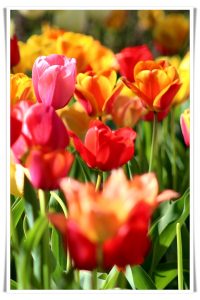 A collection of tips on how to begin organic gardening, makes the perfect starting point for a beginner to emerge and hopefully, begin growing their own organic produce much easier. Below is just such a collection that will hopefully assist the eager novice into eventually, becoming a pro, when it comes to organic gardening.
A collection of tips on how to begin organic gardening, makes the perfect starting point for a beginner to emerge and hopefully, begin growing their own organic produce much easier. Below is just such a collection that will hopefully assist the eager novice into eventually, becoming a pro, when it comes to organic gardening.
When planting next season’s vegetable garden, it is important to rotate some of the crops. For example, potatoes and tomatoes should be planted in a different spot because they are both prone to the same diseases. Keep your vegetable garden healthy and thriving by learning which crops need rotating and why.
Your tool handles can double as measuring sticks. Tools with long handles such as hoes and rakes can double as measuring sticks. On the floor, simply lay out the handles, then take a tape measure and run it next to them. Label the distances using a permanent marker. When you are gardening next, you’ll have a ruler beside you at all times.
Grow from seeds. In garden centers, it is usually much cheaper to purchase a packet of seeds than to buy the equivalent number of grown plants. Remember, if you sow some seeds before the summer, you can get a garden full of bright, colorful flowers for a very cheap price.
Having beautiful bulb plants is fun while it lasts, but once they have bloomed you are stuck with bulb foliage that is not very attractive. Try to plant bulbs among plants that will grow up and over faded bulb leaves. This way, once the lilies or daffodils are spent, the old foliage will be hidden by the new growth of other plants.
Try and start your gardens as early as possible and keep them as late as possible to maximize the amount of crops you’re able to produce. You can use things like cloches, cold frames, and tunnels to start gardening a month or more in advance. You can also use row covers in the fall to extend your harvest season.
Recycle your old pantyhose for garden use! Pantyhose make exceptional garden ties as they are very malleable, very strong and yet extremely soft, so they won’t saw into the plants you are tying up. Best of all, since you are recycling, this solution is another great way to save money.
To make the most of the water you use, be sure to water your plants first thing in the morning. Doing this makes your water less likely to evaporate, and allows foliage to dry quickly. This reduces the risk of many common diseases, and will help your plants grow to be strong and healthy.
A helpful solution for getting rid of a few slugs in your garden is to set out a container of beer. Just take a small plastic cup or container (plastic margarine bowl works great) and tuck it down into your garden beds near the area where the slugs are known to appear. Be sure the lip of the dish is level to the ground and then fill it with beer. The beer attracts the slugs into the dish where they will drown. You will have to dispose of the slugs and reset the beer “trap” every couple days, but your slugs will disappear.
Hopefully, this collection of tips were enough to give you a great start on what to do and expect when it comes to growing your own organic plants. This collection was carefully constructed to be an aid in your arsenal, so that you can begin to hone your organic gardening skills into growing healthy organic produce.